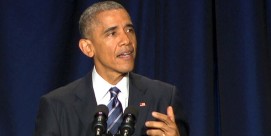Nicholas Fotion: No Good Comes from Not Intervening

It is helpful in assessing what is going on in Libya to put yourself in President Obama’s boots. If you put yourself there, you will quickly realize that you’re damned if you militarily intervene in some way or other and damned if you don’t.
If you intervene, you stretch an already overstretched US military even more. You spend tax dollars that could be spent at home instead. You support a group of I-know-not-who-they-are rebels, and you will bring about the deaths of lots of people.
If you don’t act, you will probably cause even more people to die and ensure that the rebellion against Qaddafi will quickly fail.
In Obama’s boots I find myself torn by indecision. I also find myself wondering how it is that those who don’t know how to put themselves in someone else’s boots seem to know immediately what ought to be done. Does their religious or political ideology tell them what to do automatically?
Not having an automatic appeal, I realize I must somehow overcome my indecision. I finally decide what I would have done if I had been in Obama’s boots by focusing on what good might come about by not intervening and by intervening. I find no good coming from not intervening. But there is some good on the intervention side. Very likely Qaddafi will go and possibly Libya will turn into a more liberal country (no assurances here given that Libya is still a tribal society). So reluctantly, realizing that I might be all wrong, I support military intervention rather than military inaction.
Nicholas Fotion is a professor of philosophy at Emory University and the author, most recently, of “War and Ethics: A New Just War Theory” (Continuum, 2008).







